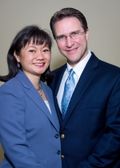The soul which hath touched any such shall be unclean until even, and shall not eat of the holy things, unless he wash his flesh with water.(Leviticus 22:6)
And when the sun is down, he shall be clean, and shall afterward eat of the holy things; because it is his food.(Leviticus 22:7)
That which dieth of itself, or is torn with beasts, he shall not eat to defile himself therewith; I am the LORD.(Leviticus 22:8)
They shall therefore keep mine ordinance, lest they bear sin for it, and die therefore, if they profane it: I the LORD do sanctify them.
There shall no stranger eat of the holy thing: a sojourner of the priest, or an hired servant, shall not eat of the holy thing.(Leviticus 22:10)
But if the priest buy any soul with his money, he shall eat of it, and he that is born in his house: they shall eat of his meat.(Leviticus 22:11)
If the priest's daughter also be married unto a stranger, she may not eat of an offering of the holy things.(Leviticus 22:12)
Other publications related to "Leviticus 22:9":
Leviticus 22:9 - Cross Reference
And ye shall bear no sin by reason of it, when ye have heaved from it the best of it: neither shall ye pollute the holy things of the children of Israel, lest ye die. (Numbers 18:32)
Or suffer them to bear the iniquity of trespass, when they eat their holy things: for I the LORD do sanctify them. (Leviticus 22:16)
Neither must the children of Israel henceforth come nigh the tabernacle of the congregation, lest they bear sin, and die. (Numbers 18:22)
And they shall be upon Aaron, and upon his sons, when they come in unto the tabernacle of the congregation, or when they come near unto the altar to minister in the holy place; that they bear not iniquity, and die: it shall be a statute for ever unto him and his seed after him. (Exodus 28:43)
And Nadab and Abihu, the sons of Aaron, took either of them his censer, and put fire therein, and put incense thereon, and offered strange fire before the LORD, which he commanded them not. (Leviticus 10:1)
And the LORD said unto Moses, Speak unto Aaron thy brother, that he come not at all times into the holy place within the vail before the mercy seat, which is upon the ark; that he die not: for I will appear in the cloud upon the mercy seat. (Leviticus 16:2)

